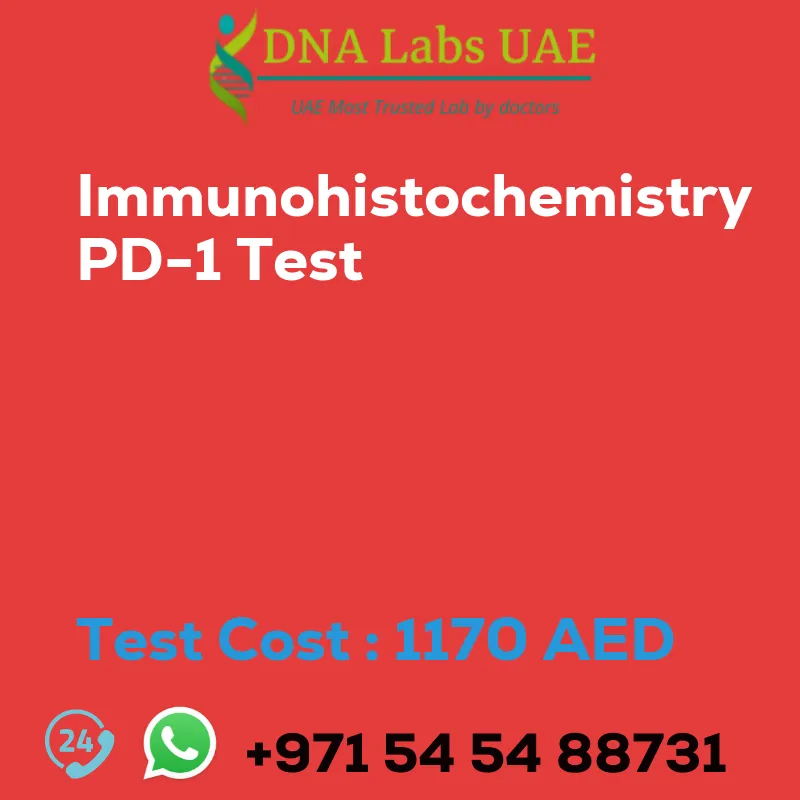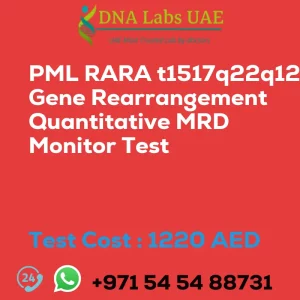IMMUNOHISTOCHEMISTRY PD-1 Test
Test Name: IMMUNOHISTOCHEMISTRY PD-1 Test
Components: PD-1 protein
Price: 1170.0 AED
Sample Condition: Submit tumor tissue in 10% Formal-saline OR Formalin fixed paraffin embedded block. Ship at room temperature. Provide a copy of the Histopathology report, Site of biopsy and Clinical history.
Report Delivery: Sample Daily by 6 pm; Report Block: 5 days, Tissue Biopsy: 5 days, Tissue large complex: 7 days
Method: Immunohistochemistry
Test Type: Cancer
Doctor: Oncologist
Test Department: HISTOLOGY
Pre Test Information: Provide a copy of the Histopathology report, Site of biopsy and Clinical history.
Test Details
PD-1, also known as programmed cell death protein 1, is a protein that is expressed on the surface of immune cells, particularly T cells. It plays a crucial role in regulating the immune response and preventing excessive immune activation.
Immunohistochemistry (IHC) is a technique used to detect and visualize specific proteins in tissue samples. The PD-1 test using immunohistochemistry involves staining tissue sections with an antibody that specifically binds to PD-1 protein. This allows for the identification and localization of PD-1 expression within the tissue.
The PD-1 test is commonly used in cancer research and clinical practice to assess the expression of PD-1 in tumor tissue. High levels of PD-1 expression on immune cells within the tumor microenvironment can indicate an active immune response against the tumor. This information is important for predicting the response to immunotherapy, as drugs targeting PD-1 and its ligands (PD-L1) have been developed and are used to enhance the immune response against cancer cells.
The immunohistochemistry PD-1 test can provide valuable information about the immune status of the tumor and help guide treatment decisions. It is often performed alongside other biomarker tests, such as PD-L1 expression, to assess the potential benefit of immunotherapy for individual patients.
| Test Name | IMMUNOHISTOCHEMISTRY PD-1 Test |
|---|---|
| Components | |
| Price | 1170.0 AED |
| Sample Condition | Submit tumor tissue in 10% Formal-saline OR Formalin fixed paraffin embedded block. Ship at room temperature. Provide a copy of the Histopathology report, Site of biopsy and Clinical history. |
| Report Delivery | Sample Daily by 6 pm; Report Block: 5 days Tissue Biopsy: 5 days Tissue large complex : 7 days |
| Method | Immunohistochemistry |
| Test type | Cancer |
| Doctor | Oncologist |
| Test Department: | HISTOLOGY |
| Pre Test Information | Provide a copy of the Histopathology report, Site of biopsy and Clinical history. |
| Test Details |
PD-1, also known as programmed cell death protein 1, is a protein that is expressed on the surface of immune cells, particularly T cells. It plays a crucial role in regulating the immune response and preventing excessive immune activation. Immunohistochemistry (IHC) is a technique used to detect and visualize specific proteins in tissue samples. The PD-1 test using immunohistochemistry involves staining tissue sections with an antibody that specifically binds to PD-1 protein. This allows for the identification and localization of PD-1 expression within the tissue. The PD-1 test is commonly used in cancer research and clinical practice to assess the expression of PD-1 in tumor tissue. High levels of PD-1 expression on immune cells within the tumor microenvironment can indicate an active immune response against the tumor. This information is important for predicting the response to immunotherapy, as drugs targeting PD-1 and its ligands (PD-L1) have been developed and are used to enhance the immune response against cancer cells. The immunohistochemistry PD-1 test can provide valuable information about the immune status of the tumor and help guide treatment decisions. It is often performed alongside other biomarker tests, such as PD-L1 expression, to assess the potential benefit of immunotherapy for individual patients. |








